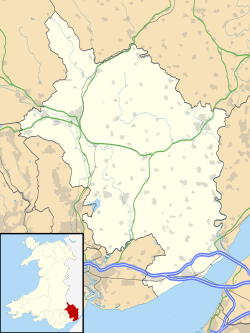St Cadoc's Church, Llangattock Lingoed
| Church of St Cadoc, Llangattock Lingoed | |
|---|---|
 Church of St Cadoc | |
| 51°52′30″N 2°55′39″W / 51.8750°N 2.9276°W | |
| Location | Monmouth, Monmouthshire |
| Country | Wales |
| Denomination | Church in Wales |
| History | |
| Status | Grade I |
| Architecture | |
| Style | Perdendicular |
| Years built | 14th/15th century |
| Administration | |
| Diocese | Monmouth |
The Church of St Cadoc, is the parish church of Llangattock Lingoed, Monmouthshire, Wales and sits in the centre of the village. It is in the Perpendicular[1] style and is a Grade I listed building as of 1 September 1956.[2]
History and architecture[edit]
The church is medieval, of Old Red Sandstone with a stone tiled roof. The nave is quite long, ending in a battlemented tower and turret.[3] The church was extensively restored in the 19th century, including work undertaken by John Prichard, following the collapse of the south wall.[1] The church is dedicated to the Welsh Saint Cadoc.
The interior includes a large wall painting of the early 15th century depicting St George slaying the dragon. The Royal Commission on the Ancient and Historical Monuments of Wales describes a possible interpretation of the painting as being a reference to the defeat of Owain Glyndŵr by the English at the battles of Campston Hill (1404) and Grosmont (1405), which were fought near to Llangattock Lingoed.[1]
There also remain some 16th-century pews, which John Newman, the architectural historian, describes as "a rare survival."[3] A timber beam with carved vine leaves and grapes is the remaining part of a late 15th-century rood screen.[2] The medieval cross in the churchyard has its own Grade II listing.[4]
Notes[edit]
- ^ a b c "St Cadoc's Church (307300)". Coflein. RCAHMW. Retrieved 11 February 2012.
- ^ a b Cadw. "Church of St Cadoc (Grade I) (1955)". National Historic Assets of Wales. Retrieved 20 March 2020.
- ^ a b Newman 2000, p. 305.
- ^ Cadw. "Cross in St Cadoc's Churchyard (Grade II) (24181)". National Historic Assets of Wales. Retrieved 20 March 2020.
Sources[edit]
- Newman, John (2000). Gwent/Monmouthshire. The Buildings of Wales. Penguin. ISBN 0-14-071053-1.

